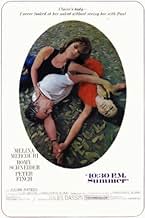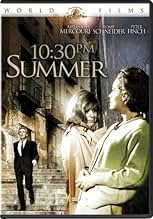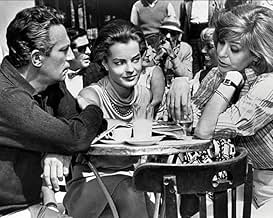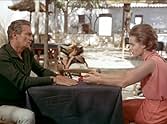IMDb RATING
6.4/10
818
YOUR RATING
A group of tourists, which relations are already complicated enough, faces with local crime incident.A group of tourists, which relations are already complicated enough, faces with local crime incident.A group of tourists, which relations are already complicated enough, faces with local crime incident.
Featured reviews
Unfortunately, this is one of the most underrated films in movie history. As a matter of fact, it's almost forgotten nowadays, because it was a flop when it came out in 1966.
Jules Dassin's fourth film with his wife, Melina Mercouri, is a slow-moving, poetic love triangle: Maria and Paul, a couple in their forties, travel through Spain with a mutual friend, Claire (played by Romy Schneider), and their daughter. On their way to Madrid, they come through a village where a man has just shot both his wife and her lover. Maria, who has realized that her relationship with Paul has changed, wants to help the murderer...
One of the most surprising twists in the plot is the lesbian relationship between Maria and Claire. Maria wants to catch Claire in Paul's arms, and in a delirious state of mind she dreams about it. The scene in the shower with Mercouri and Schneider is pretty unexpected, though.
The cinematography is just stunning, Mercouri's acting is divine, and Romy Schneider was never as pretty as in Dassin's drama. It's hard to find, but it is a must-see movie!
Jules Dassin's fourth film with his wife, Melina Mercouri, is a slow-moving, poetic love triangle: Maria and Paul, a couple in their forties, travel through Spain with a mutual friend, Claire (played by Romy Schneider), and their daughter. On their way to Madrid, they come through a village where a man has just shot both his wife and her lover. Maria, who has realized that her relationship with Paul has changed, wants to help the murderer...
One of the most surprising twists in the plot is the lesbian relationship between Maria and Claire. Maria wants to catch Claire in Paul's arms, and in a delirious state of mind she dreams about it. The scene in the shower with Mercouri and Schneider is pretty unexpected, though.
The cinematography is just stunning, Mercouri's acting is divine, and Romy Schneider was never as pretty as in Dassin's drama. It's hard to find, but it is a must-see movie!
There's not much information available about this film, but it appears to have been shot in English by Jules Dassin, who had directed Melina Mercouri in the international hit, Never On Sunday, and had gone on to make the equally popular Topkapi. This film is a decidedly smaller and artier affair, based as it is on a Marguerite Duras novel. The look of the film is distinctly 60s, and Romy Schneider never looked more beautiful. Mercouri is excellent as an alcoholic who has fallen out of love with her husband (Peter Finch) and tries to find solace by helping a murderer escape from the Spanish police. Much of the action of the film goes unexplained. There is some truly remarkable photography by Gabor Pogany, an otherwise unheralded Hungarian cinematographer who plied his trade in the Italian film industry of the 50s and 60s to little acclaim. His work here is quite revelatory, at times bringing to mind the German expressionism of the teens and twenties. Overall, an abstract delight not a million miles away from Antonioni's Blow-Up.
I remember when this film opened in London in 1967. It opened simultaneously with 'Accident' by Joe Losey, and 'Accident' eclipsed this one, as they were considered too similar: mysterious, conveying ineffable unspoken currents between people, a pervasive air of unreality and aetherial suggestiveness of things that could not quite be seen. Of the two, this was the more difficult to describe and comprehend. So 'Accident' ran for a long time, while this closed in a week. It is only now that this neglected masterpiece, doubtless buried for decades because it was 'a commercial failure', has reappeared and I have been able to see it again. The colour has not faded and is as fresh as when it was first released. Jules Dassin surpassed himself with this masterpiece. It is his greatest work. Of course, it all relies heavily upon the genius of his wife, Melina Mercouri. It is the most subtle and understated, and hence probably the most powerful, of all her overwhelmingly brilliant performances. Mercouri was more than just a genius, she was a demented and Dionysiac genius, a genuine Greek maenad, a barefoot raver on the heights of Parnassus, in the best traditions of her culture. She is here well matched by Peter Finch at the top of his form, two years after he did 'The Pumpkin Eater' and 'Girl with Green Eyes', in both of which he had proved he was one of the leading film actors of his generation. Now in this intense film together, they speak the unspoken thoughts of a highly complex marriage and of emotional ties where two people have grown together at the root: but will the root snap? The beautiful and alluring Romy Schneider is part of a strange trio on a journey in Spain, where passion crackles in the air, and the flamenco hands clap, as a murderer aged only 19 comes into the story. I read the original novella by Marguerite Duras and thought it was poorly written and, although evocative, far from being a superior work. But it provided the atmosphere Dassin and Mercouri were looking for, a hothouse of semi-articulate and complex emotions, of raging currents of suppressed passions, a crisis of existential doubts, a veritable torrent or electrical storm, to match the real storm which lashes the stranded travellers in the film. Rarely has the invisible been filmed so successfully. This film was not really filmed in Spain, it was filmed in the ionosphere, and what appear to be buildings and people are really plasmas of charged particles. Dassin rose above reality, to film what lies behind it. These things are sometimes thought and felt, they are never seen. But here he reveals them to the eye, like a cloud parting. This is not mere cinema, it is something higher.
An interesting film that still looks good after almost half a century. It's the kind of adult entertainment that demands thinking on the part of the audience. The story is the usual Marguerite Duras bubbameister masquerading as an incisive analysis of a troubled marriage. The film runs only 85 minutes; any longer and it would wear out its welcome. Beautifully photographed in a small Spanish town and countryside, with some exciting glimpses of Madrid toward the end, it's a triumph of visual style. The three principal actors (Melina Mercouri, Peter Finch, Romy Schneider) all look great, especially Mercouri, who at 45 never looked better. Husband director Jules Dassin here captured her at her peak. Peter Finch for a time just about cornered the market on these adult dramas ("The Pumpkin Eater," "In the Cool of the Day," "I Thank a Fool," "Sunday Bloody Sunday"). Plus, this trio can act, which makes all the pointless posturing and dialog seem more important than it is. I particularly like the enigmatic ending (shades of Antonioni's "L'Avventura"). "10:30 PM Summer" has enough merits to warrant seeking out this seldom-seen curiosity.
I just saw this film (at LACMA) after having seen it when it first came out. Wow! I didn't remember it that way at all! I guess when you're 19 this kind of stuff seems hot stuff, or very very deep. Now that I'm 56, I think it's just kind of pretentious but full of wonderful acting, nice cinematography and lighting, and very pretty actors! Romy Schneider looks beautiful in this, yes. But I have seen her looking even better (mostly in French films). She did, though, have some very early-50s kind of makeup, which was perplexing, considering this was '66. Melina, unbelievably, looks very contemporary; she could have just stepped out onto Rodeo Drive in 2004. I had forgotten how STRIKING her looks are. And her emoting is, well, breath-taking. Peter Finch looked so slender and drop-dead elegant. His face took MY breath away. God, what a face! (No wonder everyone supposedly from Vivian Leigh to Danny Kaye fell in love with him!) Note: Topkapi came before this film, not after. As to the plot, maybe I'm just dense, but I didn't really see the point. I just wanted to be a part of the party! Altho' Melina played, supposedly, a horrible drunkard, I felt she acted like a reasoned lady at all times and don't see what the husband and the lover were "tsch tsch"ing about. She seemed to keep it together pretty darned well for a supposed alcoholic. The whole bit about the murderer was just a turn-off to me, and I thought it kind of spoiled the fun (some of you smarties will say, Duh, that was the POINT!), but I didn't WANT the fun to stop! In sum, pretty people in exotic locales. Lots of this film was very engrossing. The actors are everything here.
Did you know
- TriviaJoseph Losey was originally announced as director.
- GoofsCigarette in Maria's hand whiles she's laying in the corridor.
- ConnectionsVersion of Dix heures et demie du matin en hiver (2008)
- How long is 10:30 P.M. Summer?Powered by Alexa
Details
- Release date
- Countries of origin
- Languages
- Also known as
- Dix heures et demie du soir en été
- Filming locations
- Provincia De Segovia, Spain(locations)
- Production companies
- See more company credits at IMDbPro
Box office
- Gross worldwide
- $8,529
- Runtime1 hour 25 minutes
- Sound mix
- Aspect ratio
- 1.66 : 1
Contribute to this page
Suggest an edit or add missing content

Top Gap
By what name was 10h.30 du soir en été (1966) officially released in Canada in English?
Answer
























